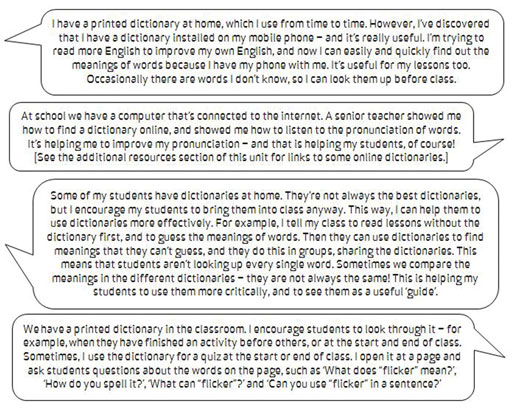4 Using dictionaries effectively
Dictionaries are a useful resource for both you and your students. As you read and listen to English, you will come across words that you don’t know, or that you can’t guess the meanings of – after all, it’s not possible to know every word in English! A dictionary helps you – and your students – to understand what a word means, and some dictionaries give you a lot more information about a word. Read this entry from Collins COBUILD Learner’s Illustrated Dictionary for the word ‘propel’:
Propel/ prəˈpel/ (propels, propelling, propelled)
- To propel someone or something in a certain direction means to cause them or it to move in that direction. Rebecca took Steve’s elbow and propelled him towards the door.
- If something propels you into a particular activity, it causes you to be involved in it. It was this event which propelled her into politics.
Wordlink: pel = driving, forcing: compel, expel, propel
This entry tells you:
- how the word is pronounced
- how it is formed in different tenses
- different meanings of the word
- how it is used in sentences
- how it is related to other words.
Not all dictionaries give this information. Nonetheless, they are still very useful, as they give an idea of what words mean, and possibly how they are used. If students have access to a dictionary in the school, classroom or at home, they will be able to find out the meanings of words themselves and will be less dependent on you. That means you will have time to do other things in your English classes.
Activity 5: Planning to use dictionaries more effectively
Part A:
Note down your answers to these questions. If possible, share your answers with a colleague.
- Do you have a dictionary?
- If you do, what kind of a dictionary is it? How do you use it?
- If you don’t, is it possible to buy or share a dictionary, or access o on your mobile phone?
- Do your students have dictionaries?
- If so, do they bring them into the classroom?
- How do they use them? Do you encourage them to use them at home?
- Is there a dictionary in your school or classroom?
- If so, how do you use it?
- If there isn’t a dictionary available, could you buy a dictionary for the classroom? Or bring one into the classroom on your mobile phone? How could you use it?
Part B:
Now read some other teachers’ answers to these questions.
Part C:
How could you improve your use of dictionaries with your own students? Choose one of the activities above and try it yourself or with your class.
3 Helping your students to record and remember vocabulary

